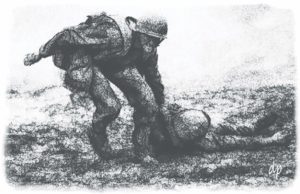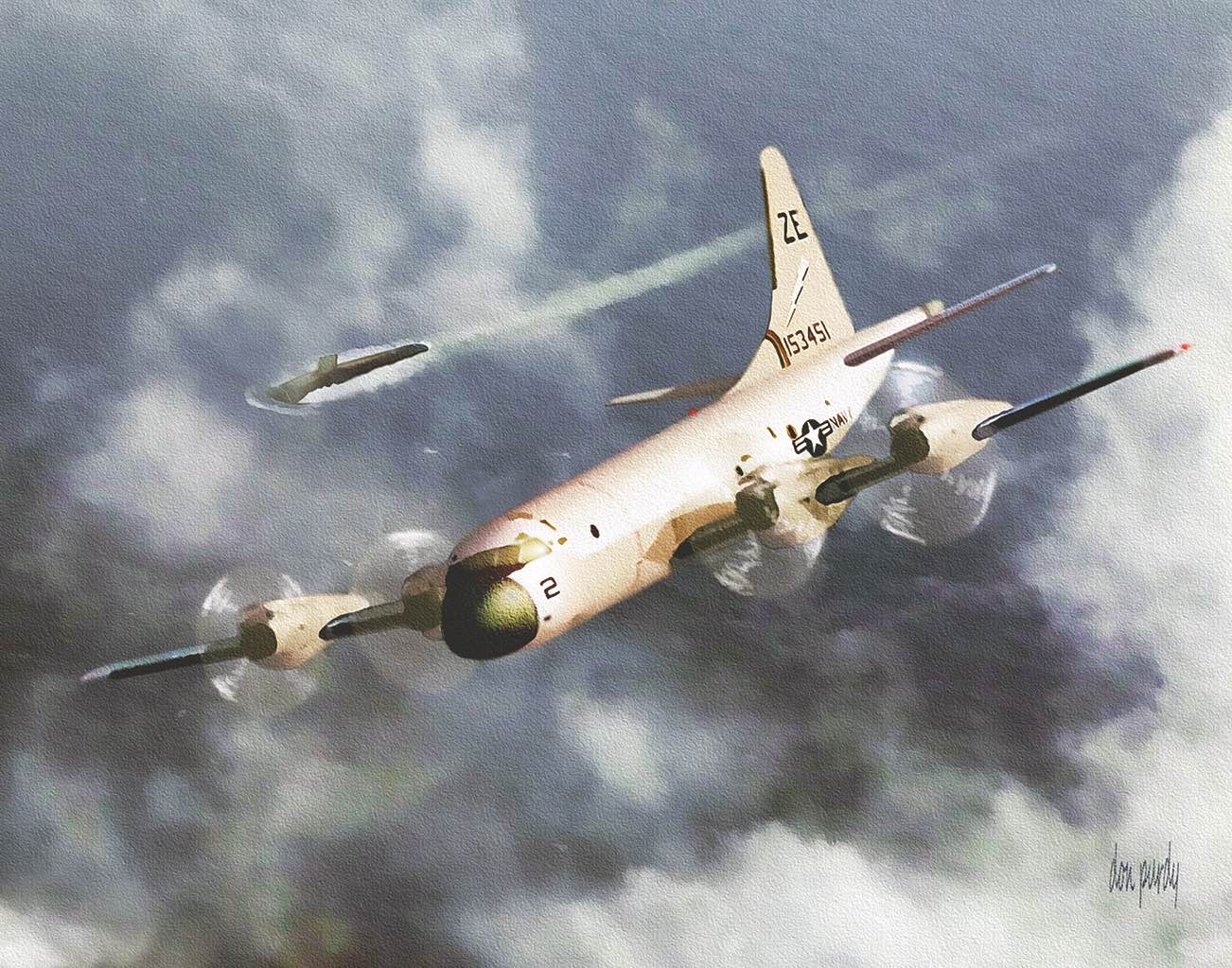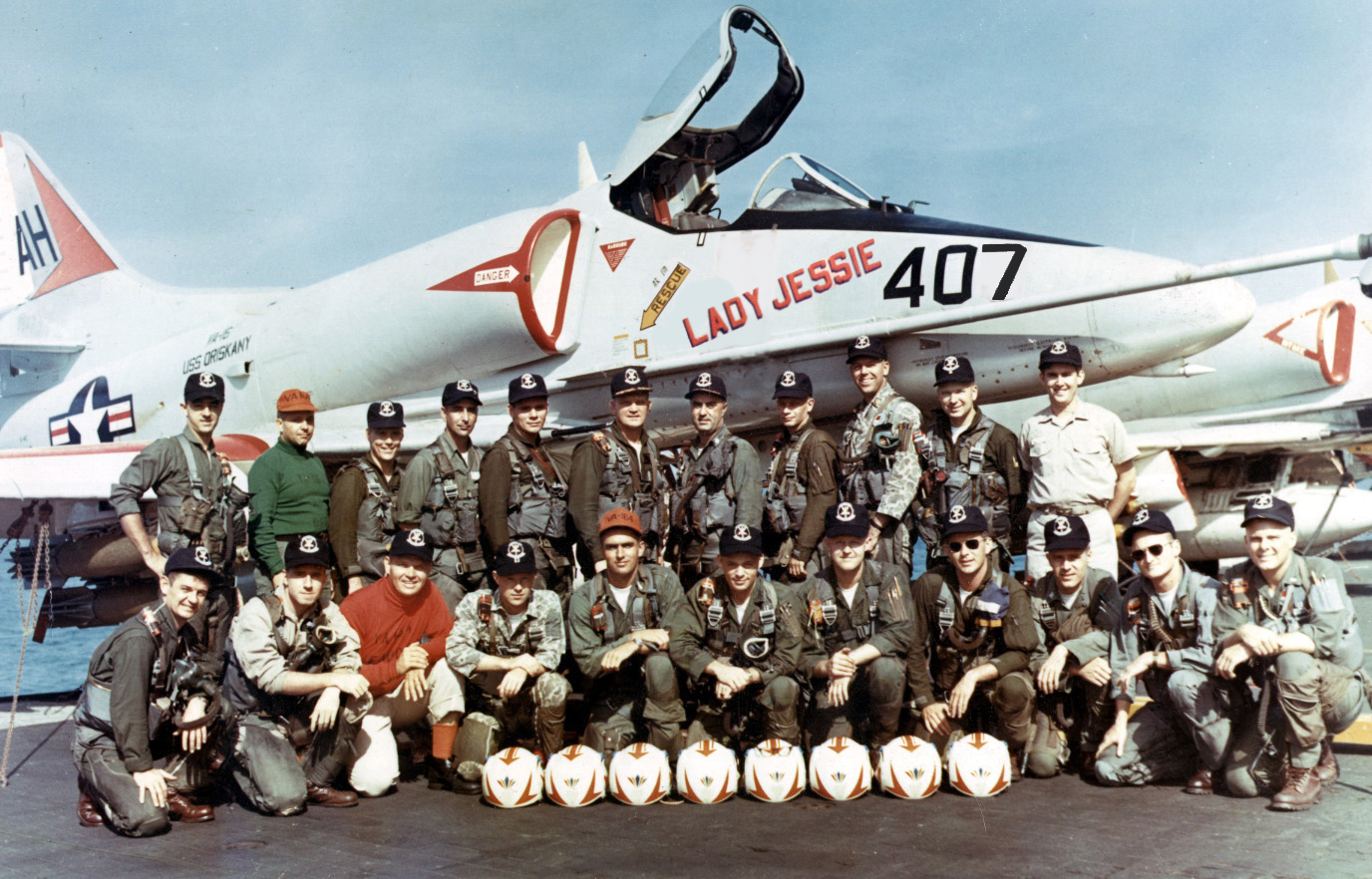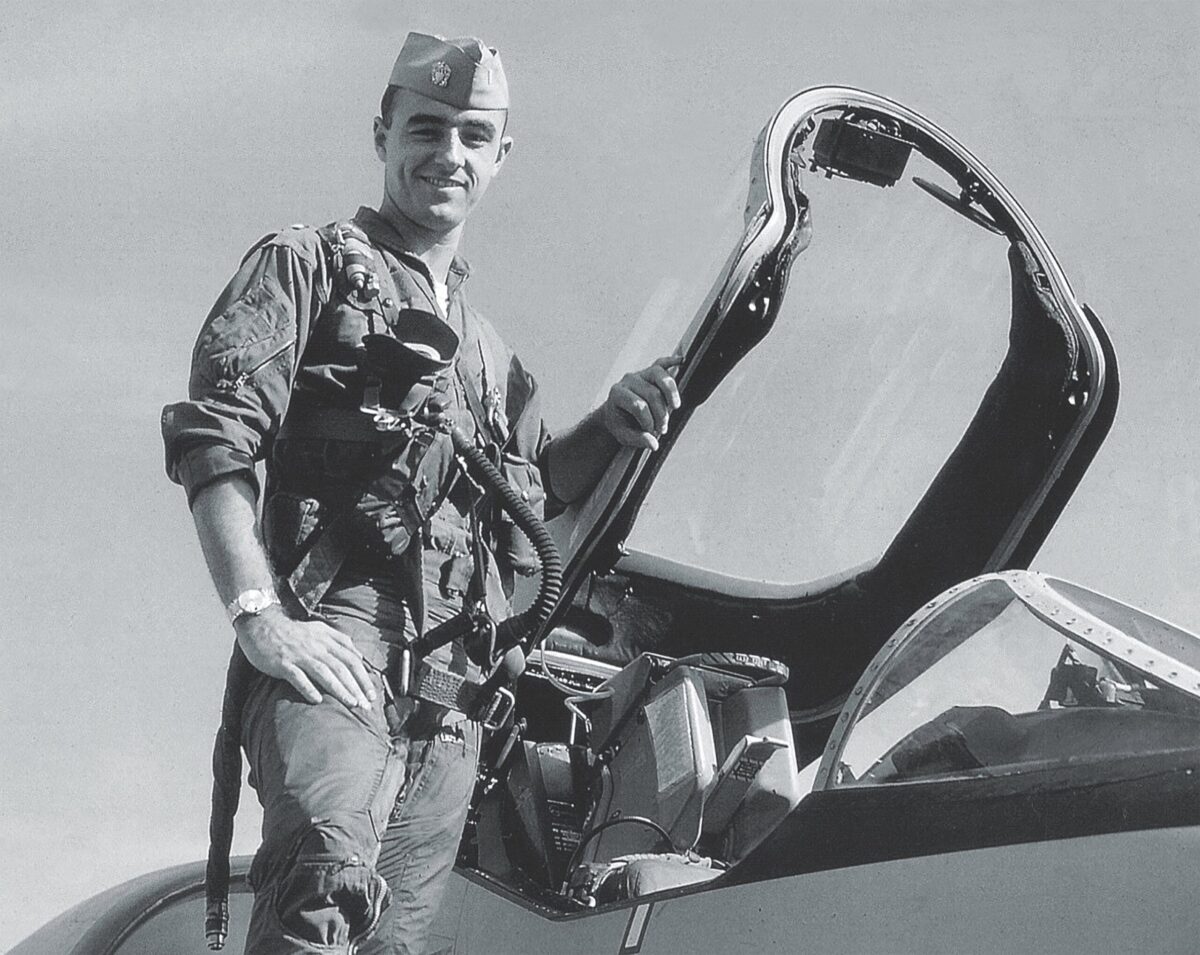“We launched day and night
From a seaborne lair
Soaring to fight
In the war-torn air
Our courage a lever
In a political game
Still we gave the last full measure
And filled a Wall with our brothers’ names.”
—”The Last Full Measure” by Don Purdy in Where the High Winds Sing: A Naval Aviator’s Poetry of War and Reflection
Former U.S. naval aviator Don Purdy flew the A-4 Skyhawk attack jet on 218 combat missions over North Vietnam from July 1967 to February 1969. He was a member of Attack Squadron VA-164, the “Ghostriders.” Purdy’s book, Where the High Winds Sing: A Naval Aviator’s Poetry of War and Reflection, won a gold medal for poetry presented by the Military Writers Society of America in 2021.
In the book Purdy recalls his difficult Vietnam experiences, including combat and its aftermath, through poetry and artwork. His squadron was part of Carrier Air Wing 16 aboard the USS Oriskany and Carrier Air Wing 21 on the USS Hancock. Air Wing 16 suffered the highest loss rate of any Navy air wing during the Vietnam War, Purdy says.
Purdy’s poetry is resonating with other Vietnam veterans and inspiring them to write about their own battle experiences. Purdy spoke with Vietnam magazine about his writing and artwork and how they give form to the echoes of warfare that might seem impossible to express.

What introduced you to writing poetry?
I read some World War I poetry, and I was impressed that these young guys in the most god-awful circumstances you could imagine were writing poetry about it that was more evocative of the horror than some longtime pros than I had read—guys like Wilfred Owen, [Rudyard] Kipling. That kind of gave me the start.
The other thing is that I wouldn’t have the focus to sit down and write either a novel or a memoir. Poetry is more suited to my limited focus.
To tell you the truth it kind of surprised me when I first sat down and tried to write some poetry. As I was writing this stuff down, it was like, “Geez, where did that come from?” Sometimes when you’re writing the line just comes to you.
What inspired you to write the book?
I guess things had been rolling around in my head for a long time—because it’s been a long time since Vietnam. I really hadn’t gotten into poetry until the last 10 years. I just started writing things down.
It was to my own amazement that some of this stuff came out. I think poetry comes from someplace down deep where there aren’t any words for it—it’s more like feelings and the process of putting words to that. That’s what I tried to do.
I would say that I am not a good painter nor a good poet, but I know what good paintings look like and I know what good writing sounds like, so I just put down stuff and start getting rid of what doesn’t sound good. I do a lot of revising.
Another factor in my writing was that I did not keep any sort of a journal or diary during Vietnam. I therefore lost a lot of details over the years, but I did not lose the feelings and deep impressions that can still lend themselves to being expressed in poetry.
How long have you been painting, and how did you start?
A long time. Probably 20 to 30 years off and on. It was mostly just a hobby. I like to paint everything. I went to the Coast Guard Academy before I went over to the Navy when Vietnam started. I started out with maritime themes and branched out. Of course, I painted aviation, but I did a whole series on rodeo stuff. It evolved over the years.
I have work in the Navy test pilot center in Maryland and one at the naval air station in Fallon [Nevada]. They [the paintings] are scattered here and there.

Did you create all the illustrations for your book?
Yes. I did all of them, including the one for the cover.
How long was the book in the making?
I’d say it was about a year. I already had a few poems, like maybe five or six. Then things started to coalesce into the fact that maybe I could put enough of them together and get something into a book.
I think the real impetus was when I went to a poetry workshop. You can’t put things off when you need to have something done the next week and everybody critiques it. That really helped.
Are there any particular military writers you admire?
Primarily writers from World War I. I got an anthology book from the library, and it really impressed me how these guys could write about that so graphically. I think some of that came through in a long poem in my book, “Songs of War,” about a guy getting shot down.
There’s a naval aviation magazine called The Hook, and a guy there reviewed it for me. He said he had to put the book down when he was reading that poem because he couldn’t get through it in one sitting—he had to go back to it. I guess it was that powerful for him. It’s amazing to hear somebody say something like that.
Can you share some background on some of the poems?
The poem called “The Debt” was the first one I wrote. I was told by a writing professor at Berkeley [University of California] that she thought it was the heart of the book, and that is what it’s all about—the loss of other guys and what that means.
There’s another one called “Matryoshka Doll.” That was based on a Marine I met who was in the barracks in Lebanon that got blown up. Hundreds of guys got killed in that thing—and he was actually buried under a whole bunch of other guys. He was one of the only ones alive. That was rolling around in my head for years. I thought, “I really would like to write something about that.” I got the idea of a Matryoshka doll with personalities one inside the other. He’s a multilayered kind of guy.
About the poem “Duel with a Flak Site”—that was the first time in Vietnam I knew I had probably killed somebody. There was like a 90 percent chance. That was another thing that was good for me to get out.
Another poem is called “Knockin’ on Hell’s Door.” If you read anything about Vietnam, you’ll know the futility of the way targeting was done during the Rolling Thunder operation. It was just going back to the same targets day after day. The whole concept of micromanaging it from the White House was absurd. There was no targeting discretion left to the people on scene. It was all directed from Washington. It was stupid. We lost a lot of guys out of the sheer stupidity of the way it was run.

The last poem in the book was written for Lady Jessie. She [Jessie Beck] owned a casino in Reno. One of the pilots in the squadron worked for her when he was going through college. She started sending care packages and stuff to all the guys. She sent so much that we started giving it to our sister squadrons and all the other squadrons on the ship, and then even giving it to other ships! She branched out and gave stuff to the Army and Air Force. At that time it was getting to be a rather unpopular war. We were kind of out there on our own—it wasn’t like World War II when the whole nation mobilized. She was an amazing lady.
We had one airplane that had “Lady Jessie” written on the side. That was at a time when there wasn’t supposed to be any nose art on Navy airplanes. The CO [commanding officer] of the squadron said, “Well, we’ll just do it, and not ask for permission.”
Then Dick Perry, the guy who worked for her, got shot down and killed in Haiphong. She continued. PBS did a documentary on Lady Jessie and Dick Perry—it’s called, Lady Jessie: A Vietnam Story. They [the filmmakers] did a really good job.
Did you get a lot of support from family while writing the book, or was it a private project for you?
My wife’s very supportive. But the process for me—the first part of it, getting going—is really tough. I’ll keep at it, and finally some stuff will start to gel. Then I get to the stage of obsessing, and that’s not too good because I can’t stand to be interrupted when I’m in that stage! She [my wife] knows now to leave me alone once I’m in “obsession mode”!
Can you tell us about some of the feedback you’ve received?
I did get some good feedback. I’m in a Vietnam veterans group in Oakland and was able to share it with them. It prompted some of the guys to start writing. I was really happy with that aspect of it.
I think the overarching thing was guys saying they thought it probably took a lot of guts for me to lay it out like that. Especially in naval aviation—you don’t admit to any frailties, it’s all bravado. But to admit you were affected by loss, by survivor guilt—I had several people say it was good to hear somebody say it.
For me personally one of the amazing things was a letter I got from my sister. She’s 18 years younger than I am. She knew I was over there but had absolutely no concept of what it entailed. I got this really nice letter from her.
Would you recommend writing poetry to Vietnam veterans?
Any kind of writing is cathartic. I’ve been amazed at the feedback that I have gotten from guys.
I think it’s because our biggest fear is fear of the unknown. If you can pull things up, name them, identify them, write about them, then you’ve taken a pretty big step of overcoming that and moving on. I think that’s what writing does. It helps you to start facing things—at least identifying them.
I really believe that everyone, particularly vets in this instance, has a story to tell. And if I can put my thoughts into an article or book, anyone can. V
“He says it was covered in bloody gauze
Yet he can see that youthful face unblemished now
He says they were lost in the din of battle
Yet he hears those last words clearly now
He says a chopper lifted the lifeless body away
Yet he still feels the weight somehow
He says the time and place don’t matter now
Yet he cannot forget
1968, Tet
5 klicks northwest of Vung Tau.”
—”He Says,” by Don Purdy in Where the High Winds Sing: A Naval Aviator’s Poetry of War and Reflection
This post contains affiliate links. If you buy something through our site, we might earn a commission.
This article appeared in the December 2021 issue of Vietnam magazine.





